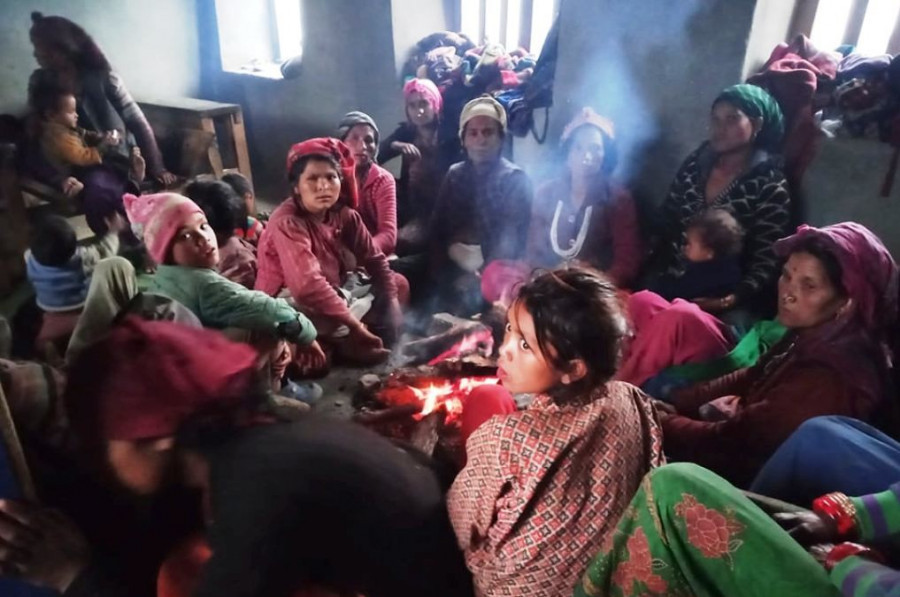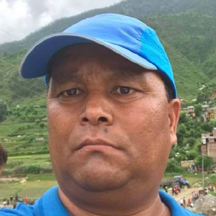National
Landslide victims in Myagdi and Jajarkot faced with uncertain future await better response from authorities
While some survivors are worried about resettlement, others are grappling with a dwindling stock of foodstuff.
Ghanashyam Khadka & Bhim Bahadur Singh
In the landslide of July 9, Bhim Prasad Jugjali of Marang in Myagdi lost four of his family members. Jugjali has been staying at the temporary shelter in Janabikas Basic School in Marang-6 since then. He is among the 60 inhabitants of the shelter.
Jugjali said that while he has received food and tent as relief, there are other needs that still haven't been taken care of.
“I haven’t had a change of clothes since the landslide struck,” he said.
But a more pressing problem for the survivors is resettlement.
“Going back to the landslide-stricken village is out of the question,” Jugjali said. “We don’t know where we go from here.”
The survivors plan to get together once they complete the 13-day rites of the deceased and discuss ways to get back on their feet again. The ward office, which is assessing the total loss caused by the landslide, is also thinking of ways to resettle the survivors, said Rajaram Subedi, ward chair of Dhaulagiri Rural Municipality Ward No. 6.
“We are currently classifying the survivors on the basis of total loss incurred,” Subedi said. “We will move them to a safe location soon.” But the safe settlements Subedi speaks of will be makeshift habitats made of tents.
In nearby Ramche Village, where 11 people were killed in the landslides, as many as 645 survivors have been moved to a community building. As in Marang, the survivors are making do with only the very basic relief material such as tents and food. Gangalal BK, a survivor, said that all of his arable land was lost to the landslides.
“All we worry about is a place to call home now,” he said.
Meanwhile, in Jajarkot, survivors of the landslide that struck Barekot Village on July 11 are grappling with a shortage of foodstuff.
The depot of the Food Management and Trade Company Limited has run out of rice.
Kare Sarki, a survivor from Barekot Ward No. 4, said that the local market is reeling under a shortage of not only rice but foodstuff such as noodles and beaten rice as well.
“We have been living at the temporary residence in a school for the past two weeks and we don’t have anything to eat,” he said.
Mahendra Bahadur Shah, the rural municipality chair, said that if the situation persists, the survivors will have nothing left to eat.
“Whatever was left in the stores of the survivors' houses has been used up and the market is reeling under a shortage of foodstuff,” he said. “And there’s no easy way to bring in food from other districts, as the roads are blocked by landslides.”
Shah added that the remote parts of the district reel under food shortage this time around every year and this year, the situation is made worse by the landslides triggered by incessant rainfall. The situation has aggravated further as many migrant workers have returned to the villages en masse after the coronavirus pandemic.
The depot of the Food Management and Trade Company, meant to serve as many as 20,000 people, is almost empty now, according to Dharma Bahadur Basnet, chief of the depot. It has only 10 quintals of rice in store, and that too has been saved for dire situations. The company had estimated that a total of 3,500 quintals of rice would be necessary to tackle rice shortage in the region but only about 2,400 have been brought in as of now, all of which have been used up.
Amid this, the displaced survivors of the landslides are in a dire situation, said chief Shah. “They bring in relief material on helicopters but they don’t last long. The regional and federal governments have not paid attention to the issue despite our requests,” he said.
In Barekot Rural Municipality, over 1,000 households have been displaced by the landslides over the past two weeks. The landslides have killed 11 people while three are still missing in the rural municipality.




 15.12°C Kathmandu
15.12°C Kathmandu
















